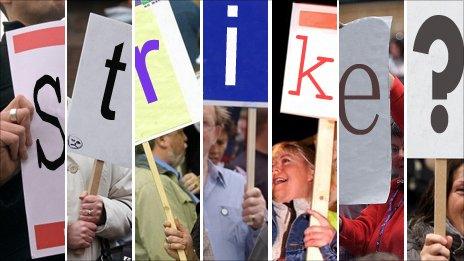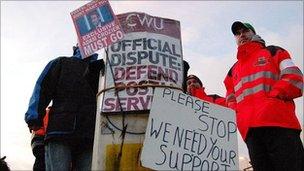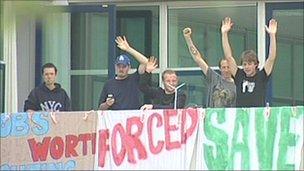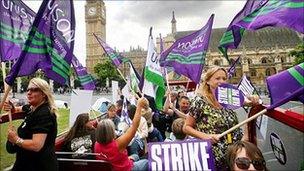Working out if strikes are worth it
- Published
- comments

Union leaders have warned of possible co-ordinated public sector strikes over pensions. But how do people who have gone on strike work out if it has been worth it?
Firefighters, Tube workers and British Airways employees have all been in the position to choose whether to strike in the last year.
At the same time, political pressure has been increasing to tighten up the laws governing the right to strike.
When considering whether to forgo your wages, it can be more complicated than a financial gamble. Emotional reasons can still figure in a calculation about whether a strike has been worth it.
Peter Harwood, chief conciliator at the Advisory, Conciliation and Arbitration Service (Acas) says it is not unusual to find complex factors caught up in industrial action.
"It's interesting that you will see people taking action when quite small sums of money are involved."
"It's because there is some greater sense of unfairness or injustice behind it," says Mr Harwood.
Show of strength
Mr Harwood says a key component of Acas's role in negotiations is to focus discussions on facts, not emotions, while maintaining all parties' credibility.
He describes part of his job as providing "a solution where both parties save face".
But these negotiations only occur between the top levels of union representatives and management. The ordinary workers are not directly involved.
This could go some way to explaining why, even after years have passed and the financial outcome is clear, some workers may still weigh up the worth of the strike in emotional terms.

Some Royal Mail workers were on strike for 16 days in 2009
While both the management and the union may come out of negotiations declaring a victory, the feeling of success or failure is often less clear among rank-and-file union members.
Take Royal Mail despatch worker Patrick Joy. A 6.9% pay rise might seem like a success from a strike, but as Mr Joy finishes his shift at London's Mount Pleasant sorting office he begs to differ.
He calculates that 16 days of lost pay from striking in 2009 works out at between £1000 and £1200 lost pay. Neither the reason for joining the strike nor his eventual disappointment were purely financial.
Mr Joy joined the strike because he believes a union member should "go with the ballot" whether he agrees with it or not. He feels unhappy with the settlement because he says it showed the union was weak against management. So any attempt at saving face Mr Harwood mentions would have been lost on Mr Joy.
"The union has lost its strength and unfortunately the management now has the upper hand and they are just telling the union take it or leave it. So they've brought changes in that they wanted anyway, irrespective of whether we went on strike or not."
The Royal Mail said at the time of the disputes that they had to put in reforms in response to a 10% decline in business.
Publicity incentive
Conversely, you might think losing £2,500 in redundancy pay-off and £450 pay all for a job you didn't manage to save would create some regrets. Not for Ian Terry. He was involved in unofficial action against his employer Vestas Wind Systems.
Vestas closed its Newport, Isle of Wight, site because it said the UK wind turbine market was not big enough.
Mr Terry and 10 other employees were sacked during an 18 day sit-in in the Vestas factory over July and August 2009.

Some workers were eventually evicted from Vestas premises by bailiffs
Mr Terry was fighting against the closure of the factory which produced wind turbines, even arguing it should be nationalised. That's something he didn't achieve. Instead he received his notice of termination of employment in a letter accompanying food sent in to the protesters.
As a result of the action Mr Terry lost his redundancy pay. Down almost £3,000, without a job and not managing to save the wind turbine factory, Mr Terry still says the publicity the case brought for an environmental cause was what made it worthwhile.
He says he wanted to let the world know that people were being sacked from jobs in sustainable energy.
"Nobody had ever done anything like that before but we all felt passionately enough to throw caution to the wind to say 'look this isn't fair the government say they are creating all these green jobs and you're kicking us out of our jobs'," Mr Terry says.
'Solidarity'
You might think a case where someone lost money and felt they won, or gained money and felt they'd lost, were perhaps not always the norm. Another example was the two-day strike by staff at a number of councils in July 2008 over a 2.45% pay offer.
Unions asked for a 6% rise but councils said they had reached the "limit of what is affordable". Eventually a 2.75% rise was agreed.

Council workers said a 2.45% pay rise was a decrease in income in real terms
Naomi Clayton worked in a local authority's IT department at the time. Striking cost her just over £100 in lost pay. She says she never recouped the pay she lost. That's because she left her job at the council before her change in income had time to amount to £100. So she concludes the strike was "probably not really worth it".
However, she echoes a sentiment expressed by Mr Terry and Mr Joy, which explains her reluctance to weigh up the costs.
"I recognise that sometimes it's the principle as well as the actual result, the monetary value."
Although she moved on from the job and then left the union, Ms Clayton says she would strike again.
"I've just got that mentality that if you're in the union, if they strike you strike. Because otherwise, what's the point of being a member if you're not going to show solidarity with the union you are in."
Changing times
These three strikers illustrate how the nature of British industrial disputes has changed greatly since the 1970s.
Ralph Darlington, Professor of Employment Relations at Salford Business School, says changing employment patterns and legislation introduced by Margaret Thatcher's government have dramatically reduced the power of union members. But he believes their basic motivations for taking strike action have not altered much.
"Obviously the world is very different from that of the 1970s, the most important feature being that trade union membership has haemorrhaged about five or six million members," he says. "This means workers' confidence and collective muscle has been undermined.
"However, their objectives have not massively changed. It's not that they were ever generally looking for anything more radical than improvements in their terms and conditions - it's just that now they are a lot weaker.
"What is new since 2008 and the age of austerity is that workers aren't so much striking to improve their terms and conditions - they are confronting attempts to hold down or cut their pay."